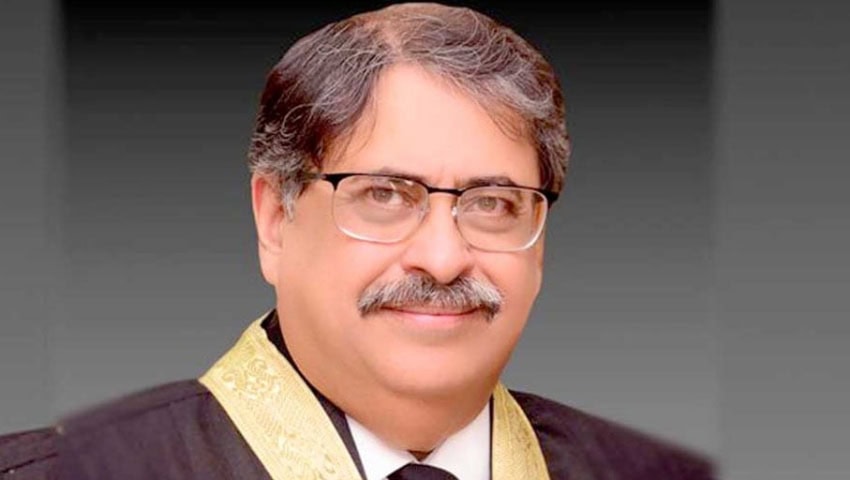ISLAMABAD – Supreme Court of Pakistan’s Justice Athar Minallah on Friday issued his detailed note on the suo motu notice regarding delay in elections in Khyber Pakhtunkhwa and Punjab, saying that the case was dismissed with 4-3 majority.
Chief Justice of Pakistan (CJP) Justice Umar Ata Bandial on February 22 took the suo motu and formed a nine-member bench to take up the case.
The bench was comprised CJP Bandial, Justice Ijazul Ahsan, Justice Syed Mansoor Ali Shah, Justice Munib Akhtar, Justice Yahya Afridi, Justice Sayyed Mazahar Ali Akbar Naqvi, Justice Jamal Khan Mandokhail, Justice Muhammad Ali Mazhar and Justice Athar Minallah.
The bench was converted into a five-member larger bench on Feb 27 by the chief justice. The top court also issued a written order of Feb 23 proceedings, stating that the matter was referred back to the chief justice with additional notes by four judges.
Later, the CJP formed a new bench comprising himself, Justice Shah, Justice Akhtar, Justice Mandokhail, and Justice Mazhar. On March 1, the apex court issued a 3-2 ruling, ordering the Election Commission of Pakistan (ECP) to hold consultation with President Arif Alvi for deciding polls date in Punjab and Governor Ghulam Ali for elections in KP.
Justice Mandokhail and Justice Shah — who were among the four judges who had written additional notes in the Feb 23 order — dissented with the ruling, saying the suo motu notice was taken by the CJP in haste and it was unjustified.
They also noted that the forming the new bench was “simply an administrative act to facilitate the further hearing of the case by the remaining five members of the bench and could not nullify or brush aside the judicial decisions given by the two Hon’ble Judges in this case, which have to be counted when the matter is finally concluded.”
They argued that Justice Ahsan and Justice Naqvi had recused themselves from the bench as they were not removed from it. “Thus, their short orders are very much part of the case, therefore, the administrative order of reconstitution of the bench by the Hon’ble Chief Justice cannot brush aside the judicial decisions of the two Hon’ble Judges who had decided the matter when the case was heard by a nine-member bench.”
They remarked that the suo motu proceedings and the connected constitutional petitions were dismissed with a majority of 4-3 of the seven member bench.
In his note, Justice Minallah has backed the argument of Justice Shah and Justice Mandokhail.
“The written order relating to the hearing held on 23.02.2023 included a separate note of Yahya Afridi, J, who had dismissed the petitions on the ground of maintainability. The reasoning recorded in the short order was persuasive and I had no hesitation in concurring with the decision regarding dismissal of the petitions. I had reiterated my decision by recording my note in the order dated 24.02.2023. I have had the privilege of reading the detailed reasoning recorded by my learned brothers, Syed Mansoor Ali Shah and Jamal Khan Mandokhail, JJs and I agree with their opinion, particularly regarding the final outcome of the petitions and the suo motu assumption of jurisdiction by a majority of 4 to 3 because this was the understanding in the meeting held in the anteroom on 27.02.2023. It is noted that I had not recused nor had any reason to dissociate myself,” read the note.
Justice Minallah further said it was explicitly observed that the power conferred under Article 184(3) of the Constitution must always be exercised with circumspection and utmost caution.
“The manner and mode in which these proceedings were initiated have unnecessarily exposed the Court to political controversies. It has invited objections from political stakeholders in an already polarised political environment. “
“The objections have also been submitted in writing. This obviously has consequences for the trust the people ought to repose in the impartiality of the Court. The Court, by proceeding in a premature matter, will be stepping into already murky waters of the domain of politics. It is likely to erode public confidence. The assumption of suo motu jurisdiction in itself may raise concerns in the mind of an informed outside observer. In the circumstances, the rights of litigants whose cases are pending before us would be prejudiced, besides eroding public trust in the independence and impartiality of the Court. This could have been avoided if a Full Court was to take up these cases,” he remarked.
He also took aim at the political parties of the country stating, “It is ironic and unimaginable for the political stakeholders to involve the Court in resolving political disputes which ought to have been settled in the forums created for this purpose under the Constitution. It is also alarming that the conduct of the political stakeholders and their political strategies would create unprecedented political turmoil and instability in the country”.
“Political stability is a precondition for economic progress and prosperity of the people. The power struggle between the political stakeholders is undermining the welfare and economic conditions of the people of this country. The people of Pakistan have been made to suffer for a long time by depriving them of their fundamental rights.”
Referring to previous rulings of the court on political matters, Justice Minallah remarked: “We cannot erase the judgments from the law reports but at least endeavour to restore public trust and confidence so that the past is forgotten to some extent. When politicians do not approach the appropriate forums and bring their disputes to the courts, the former may win or lose the case, but inevitably the court is the loser”.
Punjab elections on May 14 as Supreme Court sets aside ECP order to delay polls













